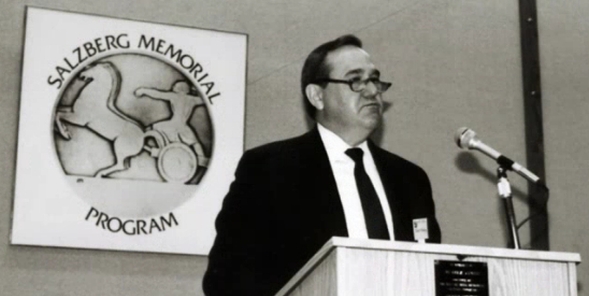
Bob Delaney was inducted into the Institute’s ‘Hall of Fame’ at their 6th Annual China Chapter dinner on Tuesday 13th of March 2006. The ceremony was held during the institute’s inaugural North American Industry Dinner held at the Buckhead Intercontinental in conjunction with the US 3PL Summit.
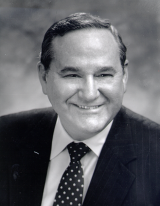
Robert V. Delaney
1936-2004
Bob’s son Mr Eddie Delaney, traveled to Atlanta to accept the accolade during an industry dinner. Mr Delaney, who died in 2004, is the first person to receive this honor.
In 2006, the Global Institute of Logistics set up a Hall of Fame to honor business figures who have made an exceptional contribution to the logistics industry. It made the institute’s own founding chairman, Robert (Bob) V. Delaney, the first member of the Hall of Fame, posthumously. Bob died April 3 2004 at age 68. He had a big hand in developing the 1980 legislation that toppled economic regulation of trucking and railroads.
During a remarkable career that ranged from military service to work in the private sector to advocacy on Capitol Hill, Bob Delaney changed the landscape of the global logistics industry in a profound and lasting way. In the early 1950’s, the Army was not only the best place to learn logistics, it was the only place. Exempt from transportation regulation, the military could negotiate with carriers and apply logistics practices that businesses couldn’t imagine. When Bob was discharged from the military and entered the private sector, he encountered a different logistics environment–one circumscribed by truck and rail regulation. Shippers could not negotiate rates. They had to design their distribution systems around carriers’ operating rights. The public suffered from poor service and high costs.
In response, Bob contributed to writing the legislation that reformed the economic regulation of the U.S. motor carrier and railroad industries in 1980. In response, Bob contributed to writing the legislation that reformed the economic regulation of the U.S. motor carrier and railroad industries in 1980. If there was any one moment that paved the way for the creation and growth of the Intermodal and 3PL industry it was the Motor Carrier Act of 1980. The act limited the Interstate Commerce Commission’s authority over trucking which had previously heavily regulated rates and made it near impossible for newcomers to start companies in the trucking industry. Before the act integrating road, rail and warehousing was impossible, after deregulation, companies that had previously been in warehousing were given more freedom to move into freight management, and increased competition in trucking moved some trucking companies into warehousing as well. Malcolm Mclean may have driven the “container” revolution but it wasn’t until 1980 and the passing of the Motor Carrier Act that the full potential of containerization could be realized.
He played a leading role in the passage of the Aviation Act of 1994 which ended the economic regulation of the trucking industry by the states. He was the co-author of two books on transportation strategy and distribution operations. His views and articles on transportation public policy have been widely published by business and transportation press. Bob received the John Drury Sheahan Award for contributions to the field of business logistics from the Council of Logistics Management in 1981 followed by the Harry E. Salzberg Award for his contributions to transportation productivity from Syracuse University in 1988. He received the Joseph C. Scheleen Award for Excellence from the American Society of Transportation and Logistics in 1992.
On presenting the award, the Institute’s Chairman, Ken Ackerman, said
“I am delighted that Bob is to be honoured in this way. It is important that his legacy lives on and that his contribution to the development of modern logistics is recognized. He was an original, always thinking ahead, always creative, and those of us who were close to him will always miss him”
Kieran Ring CEO of the Global Institute of Logistics said
“Bob gave the Institute meaning, I will always be grateful to him for accepting the role of Chairman. I am only saddened that we did not get more time to develop our relationship both personally and professionally. The Institute will work to keep his memory and ideas alive and in particular to emphasis that logistics is first a relationship driven business”
Bob Delaney wrote in his 2001 ‘State of Logistics Report’ that the development of the industry was all about the nurturing of relationships, predicting that relationships would carry the logistics industry into the future. In the light of this, promoting relationship excellence and collaboration has now become a critical element of the Institute’s work.
“I am delighted that Bob has been honoured with induction to the hall of fame. It is important that his legacy lives on and that his contribution to the development of modern logistics is recognized. He was an original, always thinking ahead, always creative, and those of us who were close to him will always miss him”
Ken Ackerman Chairman, Global Institute of Logistics
“Bob gave the Institute meaning, I will always be grateful to him for accepting the role of Chairman. I am only saddened that we did not get more time to develop our relationship both personally and professionally. The Institute will work to keep his memory and ideas alive and in particular to emphasis that logistics is first a relationship driven business”
Kieran Ring CEO, Global Institute of Logistics
“I first met Bob Delaney about 35 years ago, but we really “bonded” in 1978 when Jim Morehouse and A.T. Kearney announced that they had managed to calculate the total cost of logistics in the United States. Being the shrinking violet that he was, Bob developed his own number and described the A.T. Kearney effort as unsubstantiated, inaccurate and irresponsible. Then, of course, we all chose up sides. I aligned myself with Bob and his number, and in the end, he prevailed. A few years later, his meticulous efforts were formalized into the “State of Logistics Report” as we know it today. Many have written about Bob’s passing, his contributions to the industry, and the “State of Logistics Report.” It will be a long time before Bob’s contributions to the supply chain industry are matched.
However, there was another Bob besides ‘Bob the Logistician.’ The Bob who was my friend was not perfect. Like so many of our generation, he sometimes ate too much and drank too much. (He was one of the few people ever expelled from the Pritikin Diet Clinic.) But in his case, he also sometimes cared too much. “He immersed himself in others’ personal problems, giving financial and emotional assistance to a long list of family, friends and sometimes strangers. I saw him lose two jobs because he believed that integrity and honor trumped the corporate goals.
Bob’s care for others who needed help, and for the basic principles of honesty and integrity, often resulted in personal sacrifices that didn’t make his life any easier. But he was always willing. We will miss his caustic wit and the friendly controversy that he often inspired and even started when things were dull. We will miss reading about his telling executives like Fred Smith (founder of Federal Express) that their business models were flawed. But for those of us who knew him well, we have this consolation. Although we miss him terribly, our lives will be richer for his having passed through them.”
Maria McIntyre Executive Vice President, Council for Logistics Management
Bob Delaney’s legacy, may be best summed up by Longfellow’s “A Psalm of Life”:
A Psalm of Life
Lives of great men all remind us
We can make our lives sublime,
And, departing, leave behind us
Footprints on the sands of time;
Footprints, that perhaps another,
Sailing o’er life’s solemn main,
A forlorn and shipwrecked brother,
Seeing, shall take heart again.
Let us, then, be up and doing,
With a heart for any fate;
Still achieving, still pursuing,
Learn to labor and to wait.
Clifford Lynch, C.F. Lynch Associates
Robert V. Delaney, 68, the veteran logistician who died in his sleep on April 2 at his home in Ballwin, Mo., was a good friend to this magazine. Each year, he would provide American Shipper with an early look at his authoritative “State of Logistics Report,” which he co-authored and delivered in person each June in Washington, D.C. Delaney would discuss every detail like a worried mother hen, wanting to be sure that his egg hatched properly in print. “I do this for working people, not for professors,” he would say gruffly, knowing that each year’s report would nourish logistics theses in universities and graduate schools around the country.
Maria McIntyre, executive vice president of the Council of Logistics Management, called Delaney an “icon to the logistics profession. His contributions have been enormous, and conducted with great passion. We are devastated at his passing.” Until recently, Delaney was vice president for Cass Information Systems and a consultant to ProLogis. He also served on the board of directors of US Freightways. He also served as a consultant for CLM. In his 40-year career, Delaney acquired a hands-on understanding, as a practical manager, of every aspect of logistics. He also had the ability to develop and lucidly present data about supply chain trends. In addition, he was a superb raconteur with a sharp eye for foolishness.
Robert Mottley American Shipper

Dr. Lisa Williams
By Lisa R. Williams
On April 2, 2004, the logistics and transportation community lost a dear soul and a steadfast supporter when Robert V. Delaney passed away. Many knew him as the conceiver and co-author of the annual State of Logistics Report. But that was only part of his legacy. He was a generous spirit who freely gave of time and energy to others. He was a visionary who could see and understand what was often invisible to others.
Whether interacting with members of Congress, corporate executives, the media, or students, Bob was a tireless promoter of the business discipline we call logistics. In the words of Larry Collett, chairman and CEO of Cass Information Systems, where Bob worked for many years: “He was instrumental in raising the visibility of logistics across the country. He was a great educator…a guru to so many people who came to him for advice. He possessed the unique ability to see the future and the vital role that transportation played in our national economy and the world’s stability.”
CHAPTER 1: Trusted Advice
“Government officials and business executives at home and abroad trusted Bob’s advice. His intellectual honesty, candor, and big heart made him a close personal friend to many.”

ROGER F. URBAN
Long-time friend and former business partner Roger Urban of Urban Wallace Associates offered this perspective on the man: “Government officials and business executives at home and abroad trusted Bob’s advice. His intellectual honesty, candor, and big heart made him a close personal friend to many.”
Bob Delaney was a supporter not only of the profession but also of the people working in the profession. He was always ready to give credit, offer advice, or provide an opportunity. He was particularly engaging with young people, sometimes very young people. Roger Urban remembers when his five-year old daughter would come to see Bob at his office. “They would talk and have a great time,” Urban says. “One time my secretary asked Bob, ‘What do you talk to her about?’ Bob responded, ‘I talk to her like any other adult.’ He respected everyone and extended his heart to all he met—regardless of the age. And once Bob met you, he remembered you.” Bob had an encyclopedic memory for names and faces.
His 50-year love affair with transportation and logistics provided Bob with a vast reservoir of insights and anecdotes, which he was more than willing to share. Bob was a wonderful storyteller, blessed with an exquisitely dry sense of humor. And while no one kept count of the meetings, conventions, and associations he participated in, it certainly had to be in the hundreds—and maybe even more. Wherever he appeared, Bob spoke with enthusiasm and conviction on the contribution that logistics and logistics professionals were making to the country. Invariably, audiences left his talk with a deeper understanding of the discipline and the people in it.
CHAPTER 2: The Formative Years
“Rarely does a single individual command the respect and admiration of an entire discipline.”
Bob often recollected the dinner-table conversations he had growing up in New Jersey. With a father who was a police officer and a mother who was a labor organizer for the garment industry, Bob learned early on that you better have your facts in line to support your point. This would serve him well throughout his career. Whether providing input on legislation to deregulate the trucking industry or determining logistics costs for the latest State of Logistics Report, says Roger Urban, Bob always followed the facts.
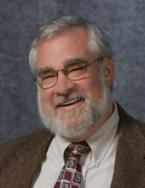
Professor John Ozment
“Rarely does a single individual command the respect and admiration of an entire discipline.”
Bob’s dedication to the field began in the early 1950s when he was an operations sergeant for the U.S. Army’s 37th Transportation Highway Division. His unit was responsible for the operation of 2,000 trucks and 7,000 men in Germany, France, and Italy. This experience gave him a valuable perspective on the important role of global transportation, a perspective that he nurtured and broadened throughout his career. Professor John Ozment, who holds the Oren Harris Chair in Transportation at the University of Arkansas, says, “Bob had a significant understanding of the role of transportation nationally and internationally. He was a man of unwavering support for the field. Rarely does a single individual command the respect and admiration of an entire discipline.”
CHAPTER 3: A Glittering Career
“Bob was the consummate professional, he gave invaluable personal and professional advice to me.”
With that solid foundation from his military service, Bob went on to make many important contributions to the profession. To cite one prominent example, he was heavily involved in writing the legislation that deregulated the interstate motor carrier and railroad industries in 1980. He also played a lead role in the passage of the Aviation Act of 1994, which ended economic regulation of the trucking industry by the states. Bob also co-authored two books on transportation strategy and distribution operations. His views and articles on transportation public policy have been widely published in both the logistics and general business press.
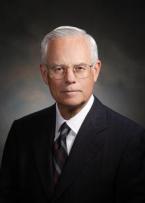
K. Dane Brooksher
Over the course of his career, Bob held senior positions at Leaseway, Ryder Distribution, International Paper, Pet Inc., Monsanto, and Nabisco. He also worked for the consulting firm Arthur D. Little and logistics services provider ProLogis. This range of experience made him an invaluable business resource.
“Bob was the consummate professional,” remembers K. Dane Brooksher, Chairman and CEO of ProLogis. “He gave invaluable personal and professional advice to me.” Adds USF Board Chairman Neil Springer, “As a founding board member of USF Corp., Bob was a guiding influence for USF from the very beginning.”
CHAPTER 4: Countless Contributions
“In 1988 Syracuse University presented him with the Salzberg Medallion for his contributions to the transportation profession”
Bob made major contributions to professional and educational associations, including the American Society of Transportation & Logistics and the Council of Logistics Management. He was a founding member of the Warehouse Education and Research Council (WERC).

The Salzberg Medallion
A life-long learner, Bob was committed to education. That commitment began when he was a student at the Alexander Hamilton Institute. It continued at New York University’s Stern School of Business, where he earned a bachelor’s degree and an MBA. Later in his career, he did post-graduate work in economics at St. Louis University and American University.
Bob’s contributions in these business and educational arenas certainly did not go unrecognized. In 1981, he received both the John Drury Sheahan Award and the Distinguished Service Award from the Council of Logistics Management. In 1988 Syracuse University presented him with the Salzberg Medallion for his contributions to the transportation profession. The American Society of Transportation and Logistics bestowed upon him the Joseph C. Scheleen Award for Excellence in 1992.
CHAPTER 5: Goodbye to the Godfather
“Bob was a leader that other leaders turned to for advice. He was a teacher to educators and a friend to everyone.”
Some affectionately referred to Bob as the “godfather” of logistics because of his benevolence, guidance, and wisdom. He was always the “go-to” guy for anyone who needed information in this field. In the manner of a true crusader, he devoted his professional life to the growth, recognition, and respect of logistics.
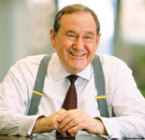
Robert V. Delaney 1936-2004
Bob was a leader that other leaders turned to for advice. He was a teacher to educators and a friend to everyone. His tireless advocacy for the people working in this profession will endure for many years to come. And yet while Bob was internationally known and respected, he seemed to be almost egoless in his tireless efforts to promote transportation and logistics and to help others.
Bob Delaney leaves behind family, friends, a fiancée, and a field that will miss him tremendously. I count myself as one member of that very large community.
Thank you Bob for a life well lived and a legacy for current and future generations.
About the Author:
Dr. Lisa Williams is CEO of Williams Research, a leadership development firm based in San Diego. She is author of the new book Leading Beyond Excellence (Executive Publishers International).
Bob was probably best known for his State of Logistics Report, wich he originated and produced annually for nearly 15 years.This report, co-authored in recent years by Rosalyn was underwritten by Cass Information Systems and ProLogis until Delaney retired as executive vice president of Cass in 2004.
The centerpiece of the report is its measurement of logistics efficiency, based on logistics spending as a percentage of GDP. Bob began calculating the ratio in 1973, when he was helping build the case for surface-transportation deregulation. He incorporated it into the State of Logistics Report when he began issuing it in 1990.
Bob’s objective with the report was to quantify the logistics-productivity gains resulting from deregulation and to bolster arguments against re-regulation. His logistics-efficiency ratio showed that logistics costs as a percentage of GDP peaked at more than 16 percent in the early 1980s, then steadily declined to their current level of below 10 percent.
The index is a useful statistic, but the real value of the State of Logistics Report has been Bob’s pithy commentary on logistics trends and developments. Each year, several dozen logistics professionals made it a point to attend his presentation in Washington.
Their time was well spent. Bob’s comments were almost always prescient. He was ahead of the curve on virtually every logistics development–and fad–in recent years. More than a decade ago, when every trucking company, warehouse operator and freight-payment service seemed to be calling itself a third-party logistics provider, Bob was among the first to warn of problems. He said many 3PLs services relied on “strategic alliances” that amounted to little more than an exchange of business cards.
During the height of the dot-com boom, when others were promoting the notion that the right software could solve any logistics problem and that most carrier rates would be set through Internet exchanges, Bob saw through the hype. “Relationships still matter,” he said. Less than a week after the Sept. 11 attacks, he provided clear perspective about the effect on logistics. He said post-9/11 security requirements wouldn’t undermine logistics efficiency, and that they probably would strengthen relationships between service providers and customers. “Just-in-time will bend, but it will not break,” he said.
1987: Cato Institute: The Disunited States: A Country In Search of an Efficient Transportation Policy
2000: The 11th Annual “State of Logistics Report”
2001: The 12th Annual “State of Logistics Report”
2002: The 13th Annual “State of Logistics Report”
2003: The 14th Annual “State Of Logistics Report”
2004: The 12th Annual “State of Logistics Report”
2003: Materials Handling & Logistics: Improve operations before collaborating
2003: DC Velocity: Born to run numbers: interview with Bob Delaney
2004: Materials Handling & Logistics: Bob Delaney’s Strange Ride
2004: Materials Handling & Logistics: Bob Delaney — author of State of Logistics Report — dies
